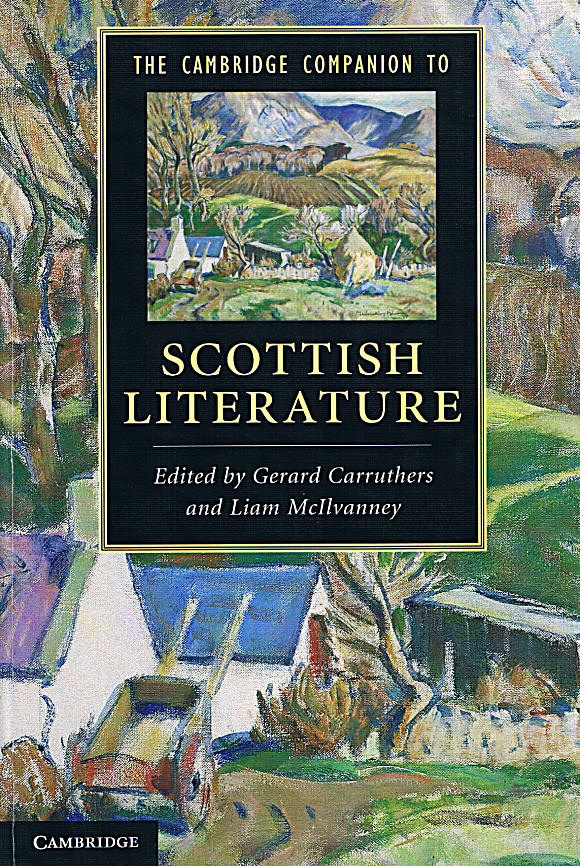|
Edited
by Frank R. Shaw, FSA Scot, Dawsonville, GA, USA
Email:
jurascot@earthlink.net
The following
description is found on both the first page and back cover of The Cambridge
Companion to Scottish Literature and, quite frankly, it would be difficult
for me or any other reviewer to improve upon it:

An Arran Croft, © of Estate of John
Maclauchlan Milne, care of Portland Gallery
“Scotland's
rich literary tradition is a product of its unique culture and landscape, as
well as of its long history of inclusion and resistance to the United
Kingdom. Scottish literature includes masterpieces in three languages –
English, Scots and Gaelic – and global perspectives from the diaspora of
Scots all over the world. This Companion offers a unique introduction, guide
and reference work for students and readers of Scottish literature from the
pre-medieval period to the post-devolution present. Essays focus on key
periods and movements (the Scottish Enlightenment, Scottish Romanticism, and
the Scottish Renaissance), genres (the historical novel, Scottish Gothic,
'Tartan Noir') and major authors (Burns, Scott, Stevenson, MacDiarmid and
Spark). A chronology and guides to further reading in each chapter make this
an ideal overview of a national literature that continues to develop its own
distinctive style.” With this book, editors Gerard Carruthers and Liam
McIlvanney, as well as the authors of each chapter, have, in my opinion,
presented a tremendous gift to each of us.
Some of you
may ask why a book on Scottish literature is being reviewed on Robert Burns
Lives!? Nigel Leask, Regius Professor of English Language and Literature at
the University of Glasgow, head of the School of Critical Studies, and a
Fellow of the Royal Society of Edinburgh, was assigned Chapter 5 of the book
with the simple title of “Robert Burns”. While time and space prevent a look
at each of the 19 chapters, I am compelled to tell you about this chapter.
In his first
sentence Professor Leask states that Robert Burns “has a good claim to be
considered the most original British poet writing between Alexander Pope and
William Blake”. He goes on to say that “Burns crafted the first modern
vernacular style in British poetry…” and yet “Burns has been marginalised in
English departments across the world, as result of a mistaken view that his
writing is linguistically incomprehensible, and of interest to Scottish
readers only”.
Leask writes
that a lot of verse by Burns was not published during his lifetime and
formed what Gerry Carruthers calls Burns’s “reserved canon”. Masonry played
an important part in the young life of Burns, placing him on equal footing
with the middle and upper classes and helping to transport him from “a local
to a national poet” which paved the way for his triumphant reception in
Edinburgh. His Commonplace Book exposed Burn’s poetic ambitions to a wider
audience than that of a local bard, making him “Scotland’s bard” almost
overnight. He realized his national bard dream was within reach after the
publication of 612 volumes of Poems Chiefly in the Scottish Dialect, (which
became known as the Kilmarnock edition) quickly sold out and became the most
prized of his works. (Editor’s note: Only 72 of the Kilmarnocks are
accounted for today.) John Wilson, Burns’s publisher, did him a big favor by
not publishing a second printing and Burns found his way to Edinburgh,
encountering a new and exciting world. Leask takes us through the poems and
songs published in “the most wanted book of Burns” as well as the Edinburgh
editions which in reality produced the first and only “big money” Burns ever
made in his life.
The final
section of this chapter deals with “Burns and song” and the majority of “the
c. 373 Scottish songs Burns composed or adapted” actually prove Burns is
“unquestionably the outstanding songwriter of the Romantic period’ and some
critics even say, as I do, that Burns’s “achievements as a songwriter
outshine those of the poet…” I have never understood how Burns could refuse
to accept pay for the songs he wrote or reworked when his family,
particularly at the end of an all-too-short life, was hungry and nearly
destitute. Leask says it best: “In the spirit of patriotism, the poet
refused to accept any payment for his work”. To me, his songs were his own
personal gift to the people of Scotland and he would not taint that gift by
accepting money.
Leask ends
his chapter on Burns with a few words about his “premature death in the
summer of 1796 (probably from rheumatic heart disease)…” which led to “much
soul searching among family, friends and admirers, and for moral blame from
his detractors”. Lurid accounts of his last years in Dumfries and subsequent
death were not helped by the pens of George Thomson and Robert Heron nor did
Dr. James Currie do him any favors with his Works of Burns.
Professor
Leask sums up his conclusion about Burns with these words, “…the time is
ripe to reassess Burns as not only Scotland’s greatest poet, but also a
Romantic poet of European stature, in the same league as Blake, Wordsworth,
Coleridge, Byron and Shelley. His unparalleled reinvention of Scottish idiom
and identity offers a new orientation to the entire cultural geography of
Romanticism in British Isles and beyond”. I believe this chapter to be one
of the best I’ve ever read on Robert Burns.
(FRS:
8.14.13) |
